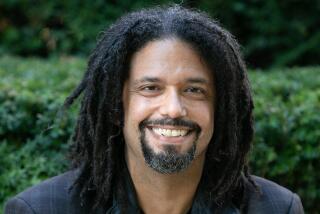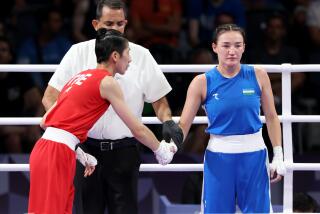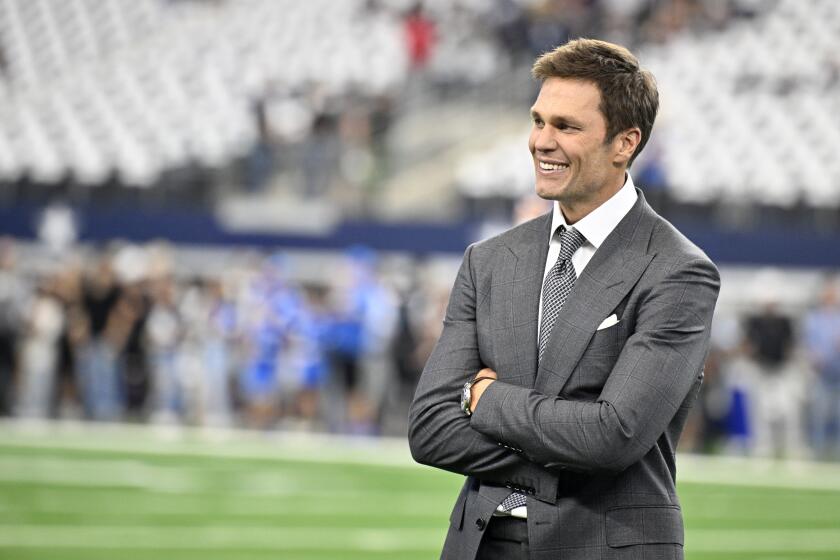Will They Say ‘Cheese’ for Heavyweight Picture?
On Friday the 13th at Las Vegas, Riddick Bowe will be fighting for the heavyweight championship of the world. But the heavyweight champion of the world will be fighting for his life.
That’s life as in career, reputation, historical importance, place in the human standings, public perception.
Right now, Evander Holyfield comes into focus as the Calvin Coolidge of the heavyweight ranks, a nonentity, a weak link in the chain of leadership.
Every man worries about how he addresses posterity and how posterity addresses him. Athletes play for money in the short run but fame in the long run. You want to live your life out as legend, not lucky.
In a way, Holyfield is lucky he came along when he did. There was a vacuum in the heavyweight division. The man with the skills--the thrills, if you will--was in prison. What was left was a passel of misfits, overage, overweight former champions, underachieving contenders, glass-chinned Europeans and overrated palookas. Evander became champion almost by default. Like the proverbial one-eyed man, he headed the kingdom of the blind.
He’s the beneficiary of a fortuitous--for him--set of circumstances. Buster Douglas would never again knock out Mike Tyson--and then come into the ring for his first title defense 30 pounds overweight, undertrained and looking for a soft place to lie down early in the fight and go home with $20 million.
Holyfield was lucky he waived his legitimate shot at Tyson to permit the champion to fight Douglas in Tokyo. Tyson would never have come into the ring against Holyfield as overconfident and ill-conditioned as he did against the underrated Douglas.
The last man to arrive at the championship on a similar road, a comparable set of odd happenstances, was Jess Willard. In Willard’s era, the real heavyweight champion, Jack Johnson, was not in jail, he was in exile. He had been hounded out of the country by a misapplication of a little-used federal statute called the Mann Act, which prohibited the transportation of women from one state to another for immoral purposes. The law was meant to apply to prostitution, not to travel with one’s fiancee.
So, Willard became champion the same way Holyfield did--fighting an overweight, under-conditioned, uninterested champion (Johnson) whose only concern that hot day in Havana was the money, not the title. Boxing lore has it the purse was not the only money Johnson collected for collapsing in an exhausted heap in the 26th round.
But Holyfield shares another un-distinction with Willard. They both became champions during an interregnum, those dry spells that seem to afflict any line of succession, whether it be kings of England, presidents of the United States, golf or tennis stars--or heavyweight champions of the world.
Willard was champion between the eras of Jack Johnson and Jack Dempsey, an unenviable spot on the bill for even a dog act. Besides, he had to share headlines with World War I, which made a fistfight look absurdly irrelevant.
These interregnums are endemic in the fight game. After Johnson came Willard--and nobodies such as Carl Morris, Fred Fulton and Gunboat Smith. Did you know that somebody named Marvin Hart held the title after James Jeffries retired? And was succeeded by somebody named Tommy Burns?
Willard, fortunately, lost to Jack Dempsey to give boxing its first golden era. But after Dempsey, his conqueror, Gene Tunney, tried to keep the dynasty going by fighting a colorless Aussie named Tom Heeney. Nobody came.
The heavyweight division floundered for years with talent-less titleholders such as Jack Sharkey, Primo Carnera and James Braddock, until Joe Louis came along.
After Louis, the game had Ezzard Charles and Joe Walcott, until Rocky Marciano came along.
After Rocky, it was Floyd Patterson’s turn to put the population to sleep. Till Muhammad Ali came along and put the sport back in prime time and Page 1. “After me, boxing will become nothing!” Ali boasted.
He was almost right. After Ali, we had--God help us!--Larry Holmes. And then a bunch of “contenders” named Trevor Berbick, Renaldo Snipes, Ossie Ocasio, Mike Weaver, Scott LeDoux, Gerry Cooney, and Something Witherspoon. The ring lights were blinking out when Mike Tyson came along. Boxing was on Saturday afternoon. Between the tractor drag races.
Evander Holyfield is occupying center ring in what should still be the Mike Tyson era. He is wowing the customers by outpointing the likes of Tyrone Booze, Henry Tillman, Carlos DeLeon, Pinklon Thomas and defending his “title” against former champions who are so old the public is not only surprised they are still fighting, it is surprised they are still alive--or, at least, ambulatory.
Which is why Holyfield is defending more than his championship in Las Vegas on Friday night. He is defending his good name. Boxing has a name for a champion who reigns bogusly. It’s “cheese champion” and it’s meant to identify a pretender on the throne, a guy who ascended by artifice, not art.
If Holyfield doesn’t destroy Riddick Bowe, he’s Marvin Hart. If he beats Riddick Bowe he doesn’t suddenly become Jack Johnson--or Jack Dempsey. But he might be Gene Tunney. If he goes on to beat Tyson, the arguments in the bars someday might be, “Who was better--Evander Holyfield or Muhammad Ali?”
More to Read
Go beyond the scoreboard
Get the latest on L.A.'s teams in the daily Sports Report newsletter.
You may occasionally receive promotional content from the Los Angeles Times.










